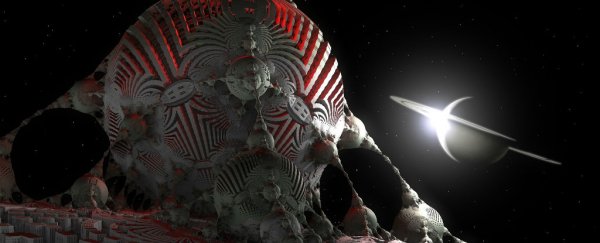As the Fermi paradox states, the Universe is a vast, unknowable space, filled with trillions upon trillions of potentially habitable planets, so… where are all the aliens?
In the latest attempt to solve this conundrum, a trio of researchers have suggested that advanced alien civilisations have gone into self-imposed 'hibernation' - waiting for a future where the Universe is far colder than it is now, which would facilitate the kind of processing power we could only ever dream about.
A new paper written by Oxford neuroscientist and AI expert, Anders Sandberg and Stuart Armstrong, together with Milan Ćirković from the Astronomical Observatory of Belgrade, Serbia, argues that civilisations far more advanced than us could have conceivably explored a big chunk of the Universe already, and are now waiting for a better time to be alive.
"Right now, the cosmic background radiation makes nearly everything in the Universe hotter than 3 Kelvin, but as the Universe expands, this background temperature will decline exponentially," write Sandberg and Ćirković on their blog.
"So if you want to do as much information processing as possible with the energy you have, it makes sense to wait. It becomes exponentially better."
Now, let's just say up front that there's no way to actually 'prove' any of this, and the researchers are obviously having a bit of fun with it - even they admit that the most likely reason we can't find aliens is that they don't exist or are too far away.
But they say this train of thought not only helps us rule out many possibilities related to the Fermi paradox - it also gives us important insight into our own chances and potential future in the Universe.
"If you don't check your less favoured hypotheses, you are not doing science," Sandberg told George Dvorsky at Gizmodo.
So with that out of the way, let's get knee-deep in the so-called Aestivation Hypothesis (aestivation meaning prolonged torpor or hibernation).
The premise is based on the assumption that the more advanced a society becomes, both culturally and technologically, the more likely it will be to transition from biological to almost entirely machine-based.
If we humans are already starting to build bionic body parts and devices that can merge a living brain with artificial intelligence, imagine what civilisations with thousands - or even millions - of years on us would have achieved already.
As this NASA scientist once suggested to the professional alien-hunters at SETI, we should not be limiting our search to biological signs of life - we need to also be seeking out extraterrestrials who have "long ago advanced beyond flesh-and-blood to artificial intelligence."
The idea behind Sandberg and co's paper is that civilisations more advanced than us would have figured out how to ditch their inefficient and death-prone biological bodies by uploading their minds to a machine, making processing power the most precious resource of all.
Elon Musk himself has argued that this has already happened, and we're all living in a Matrix-style illusion.
The Aestivation Hypothesis argues that if processing power - hence, energy - is the sole resource sustaining such a civilisation, then the right conditions are crucial for continued advancement.
"There is a thermodynamic cost to perform information processing that is temperature dependent: in principle, running processing become 10 times more efficient if your computer is 10 times colder (measured in Kelvins)," Sandberg and Ćirković explain on their blog.
So, judging by how the expanding Universe is expected to cool over the millions of years ahead, post-biological aliens could consider putting themselves into 'sleep mode' to skip the crappy conditions of the present.
"[A]n advanced civilisation may have explored a big chunk of the Universe, done what is doable with existing nature, and now mostly have internal 'cultural' things to do," say the researchers.
"These things can be regarded as information processing. If they want to maximise processing they should not do it today but wait until the cold future when they will get tremendously more done (1030 times more!)."
It probably won't surprise you to hear that not everyone is convinced by this logic. Astrophysicist and sci-fi expert, David Brin, told Gizmodo it doesn't make a lot of sense to forego thousands or millions of years of advancement just to end up in a more energy-efficient future:
"[W]hile you may get better at computation in a colder Universe, you are foregoing all the computation that you might accomplish if you just kept cranking away during the warmer times."
But Sandberg argues that it's a case of having your cake and eating it too - you can't have it both ways, as Brin is suggesting.
"Imagine having a wallet with a limited number of dollar bills (energy) and buying cakes after Christmas that are getting cheaper over time (eventually levelling out at some low price)," he told Gizmodo.
"If you want to get as much cake as possible, you should save your bills until the cakes reach their minimum price. Anything else will get you less cake."
The paper has been accepted for publication in an upcoming edition of the Journal of the British Interplanetary Society, but you can read it in full over at the pre-print website, arXiv.org.
And we can definitely recommend Sandberg and Ćirković's blog post on the hypothesis, which covers such questions as "Have you solved the Fermi question?" "Do you really believe in it?" and "What is the point?"
At times like these, when things are looking pretty dire for Earth's future, maybe it's not such a bad thing to be considering the ins-and-outs of living in a hard drive on Mars.
